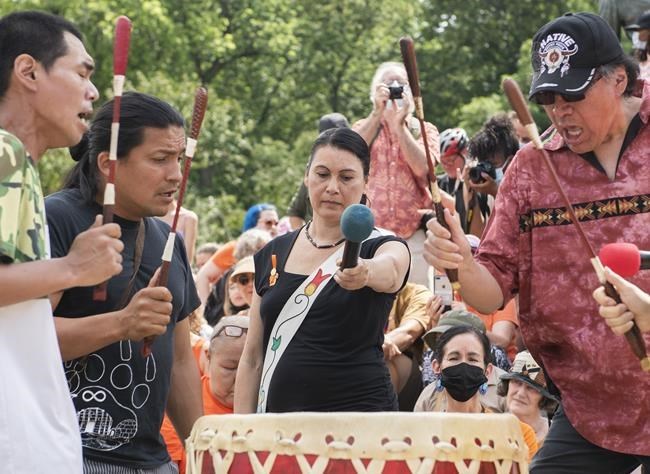MONTREAL — A Montreal-based child and family services agency isn't serious about improving care for Indigenous youth, and no one is holding it accountable, an advocate for Indigenous people said Friday.
Nakuset, director of the Native Women's Shelter of Montreal, says that while Batshaw Youth and Family Centres has received recommendations from Indigenous communities and the province's human rights commission, the agency isn't implementing them.
Her comments are in reaction to an incident in April that only became public recently, in which an Inuk teenager at a Batshaw rehabilitation centre north of Montreal was allegedly put in isolation despite being in pain and needing emergency surgery. Quebec's human and youth rights commission started investigating in early October.
"It's atrocious what they did to this kid, so you have to do something, but there is a whole system that's completely broken, and no one's doing anything about it," Nakuset, who uses one name, said in an interview.
Her organization started working with Batshaw in 2013 to help it improve the treatment of Indigenous children in care, but she cut ties with the agency in September 2021. Nakuset said she doesn't believe Batshaw has implemented any of the recommendations made by the human and youth rights commission in the spring of 2021, after the watchdog found that Inuit youth in care were at times forbidden from speaking their own language.
And, she said, Quebec Premier François Legault's refusal to recognize the existence of systemic racism gives people at government institutions permission to ignore the realities around them.
"If no one is holding them accountable, they're never going do it, no one is forcing them, and this is why, when you have a government like Legault’s that doesn't believe that there's any systemic racism, that this continues," she said.
Nakuset and Fo Niemi, the executive director of the Center for Research-Action on Race Relations, a Montreal-based civil rights organization, have been calling for the rights commission to launch a broader investigation into systemic racism at Batshaw, both in regards to the way it delivers services to Indigenous youth and into the underrepresentation of Indigenous staff at the agency.
Nakuset says that while Quebec's human and youth rights commission has opened an investigation, the watchdog shouldn't have waited until after the incident received media attention. Niemi, meanwhile, said that the investigation is being carried out under the Youth Protection Act rather than the Quebec Charter of Human Rights and Freedoms; therefore, he said, details of the incident will not be made public and the watchdog has no power to ensure its recommendations are implemented.
"There's no monitoring and there's no accountability," he said. "That's why these problems are perpetuated."
Dalia Alachi, a spokeswoman for the commission, said in an email that it is following up with Batshaw to ensure recommendations are being implemented, adding that the agency has taken steps to offer Indigenous interpretation services to youth in care.
Alachi said that in the majority of the investigations under the Youth Protection Act, changes are made while the probe is ongoing. She said that while young people involved in cases can't be identified, recommendations can be made public.
Niemi said he believes the incident was not properly reported to authorities in accordance with Quebec's Youth Protection Act, and he questions whether the provincial government would have acted differently if the youth was not Indigenous.
"If this was a white youth with blond hair and blue eyes, trust me, the government would respond immediately and order an independent investigation and demand full answers from Batshaw's top management as to what exactly happened, why this was kept quiet for so long," he said.
Lambert Drainville, a spokesman for Lionel Carmant, the province's junior health minister, who is responsible for youth protection, would not comment specifically on the April incident, citing the rights commission investigation. He said steps have been taken to ensure that youth at Batshaw can speak their own language and that "cultural security" training for staff is ongoing.
"We do not tolerate any form of violence, racism or discrimination towards the young people under our protection and their families," Drainville said in an email. "When allegations of these actions are brought to our attention, we take that very seriously and take action immediately to shed light on what happened."
The health authority that oversees Batshaw declined to comment Friday. It said on Thursday that it has taken action to protect the "cultural security" of the youth under its protection, including by hiring Indigenous staff and rewriting policies to affirm young people's rights to speak Indigenous languages.
This report by The Canadian Press was first published Oct. 14, 2022.
Jacob Serebrin, The Canadian Press



